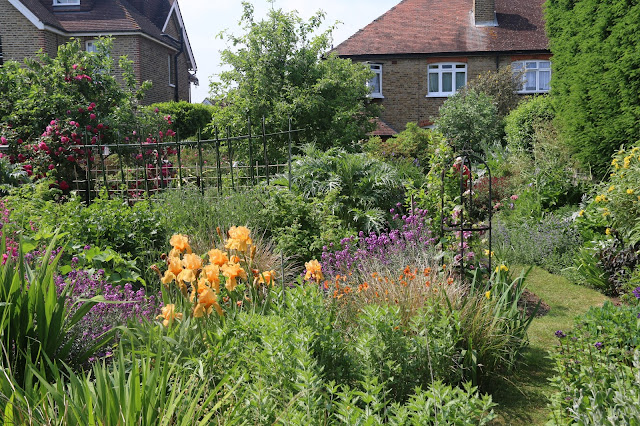When we were down in London
the other week I couldn't resist popping along to a group garden
opening for the National Gardens
Scheme (NGS). This one was a selection of three properties in the
south-west London suburb of Hampton Hill. With its wide residential
avenues and mixture of housing stock it was ripe for some garden
inspiration and I wasn't disappointed.
The first property we went
to was an inter-war semi-detached house. That's the great thing about
visiting NGS gardens is that they are real gardens tended by ordinary
but dedicated people. The roses in the front garden gave a flavour of
what can be found round the back. Here a rambling rose hugs the back
wall.
One of the striking features
of the garden has nothing to do with plants or flowers but more to do
with the practical history of the house. This little door leads down
to the original World War II air raid shelter.
The mound that surrounds the
air raid shelter has been used to build up a rockery complete with
water feature.
As always I like to see a
veg patch. The greenhouse is positioned right in the middle of the
garden rather than being hidden away at the back. I can see some of
the tomatoes have been planted directly into the soil in the
greenhouse. I have seen this before but I've been unsure about not
being able to move the plants around.
Next to the greenhouse is
the outdoor veg patch. Runner beans are in position and the
gooseberries looked nearly ready to pick. This was the only part of
the garden with soil visible. Everywhere else was crammed with
herbaceous plants and stunning architectural foliage.
Onto the next house which
was round the corner. This was completely different. The house was
one of five very large properties that were originally built on this
road. The others have been knocked down or completely modified in
some way. The house was originally surrounded by large grounds but
these have been partially sold off over the years. However what
remains of the garden is still enormous! The owners maintain it all
themselves and were in a bit of a panic as only a week before the
opening the house was covered in scaffolding.
With such space there are
clear, dedicated areas. The light blue of the table and chairs give
the eating area a fresh touch.
Behind the eating area was
the vegetable patch therefore giving one of the shortest examples of
field to fork.
I was interested to see that
the spring bulbs are dug up each year and hung up by the tool shed. I
keep mine in the ground but I'm not keen on the scruffy, yellowing
leaves this method gives. What do you do with your spring bulbs after
they have flowered?
We didn't bring the kids
with us on this visit but I know they would have loved this expanse
of lawn. It wasn't quite big enough for a full-sized tennis court but
I'm sure I could have modified one!
The whole garden has been
designed to be wildlife friendly and this is particularly evident in
the two ponds.
The last garden was just
across the road but what a difference! These houses were built much
later and in a far less grand scale. What I did notice walking around
was the popularity of water features in the gardens. This wasn't just
in all three back gardens we looked at but also in the front gardens
of others we passed by.
Going down the side passage
one the first things we noticed was the colourful pots hung on the
fences and the glass sculptures. Although this garden was quite
compact it was divided into five garden rooms.
The continuing theme around
the garden was of Africa. At the bottom there was a grass thatched exterior
sitting room. Whilst admiring the view in them you were overlooked by
a group of giraffe statues. The elephant next to them was another
water feature and every couple of minutes it tilted up and water came
sprouting out of its trunk. It's amazing what you find hiding at the
back of a house!
Hosted by Fable and Folk

















It's fascinating seeing the ideas people have used in their gardens. I've been meaning to visit some of the open gardens around us but so far haven't done it. I'm on holiday this weekend but now am inspired to see what's on when I return.
ReplyDeleteOooh, how lovely to see a whole road's worth of gardens at once! Fascinating to see all the contrasts between the same area. I, too, must head out to an NGS garden soon, I've not been to a single one this year.
ReplyDeleteAmazing how much effort was given to make this! The details and the design is lovely! love the lushness of the plants and those statues really add up to the theme =)
ReplyDeleteHampton Court is the site of England's greatest medieval hall with a massive decorated hammer-beam roof. The history of Hampton starts with the Knights of St John who acquired the manor of Hampton in 1236 and used the site as a centre for their agricultural estates to store produce.
ReplyDeleteWhat an amazing garden! I love it. As for bulbs it is a bit of a battle between me and he who wields the strimmer! I want the leaves left until they have died down, he wants them strimmed off LOL #HDYGG
ReplyDelete